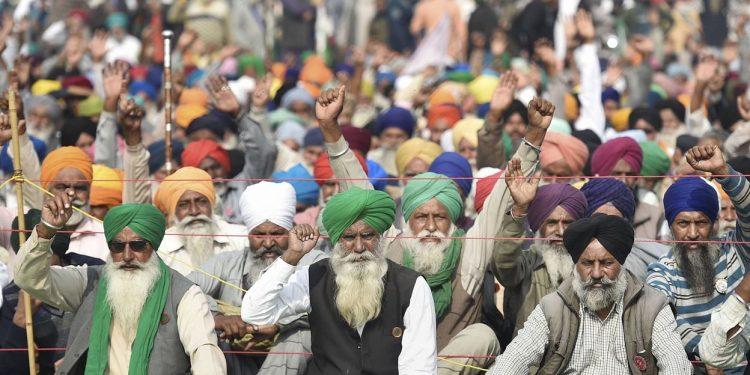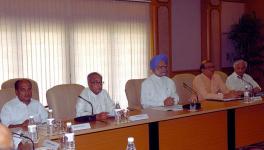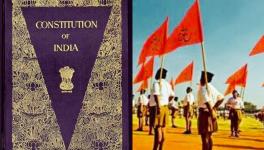What BJP-RSS Might Learn from Repeal of Farm Laws

Image Courtesy: The Quint
It was an unprecedented mobilisation with clarity of purpose. When protesters get down on the streets, they often imagine that their demands would be met in a few days, but when farmers gathered at Singhu border a year ago, they announced they had come prepared to stay for six months. They knew what it would take to get the laws repealed. Such uncanny clarity was partly owing to the role of Left-oriented peasant organisations, but the resolve to fight to the finish came from the presence of wealthy farmers, who had both the resources and the understanding of those who remain a part of the hegemonic block of the ruling elite.
Wealthy farmers in post-independent India constituted the ruling elite, alongside the nascent industrial bourgeoisie and the urban-professional middle classes. Steadily, the agricultural sector was sidelined in State investments while State policy tilted heavily towards corporate capital in alliance with a ‘transnational capitalist class’ and an emergent global middle class. Consumption, mega-development and aggressive urbanisation propelled the neglect of rural India, though the majority of the population remained dependent on it for its livelihood. P Chidambaram, Finance Minister in the UPA government, had announced that by 2050, 80% of the Indian population would reside in the cities. Growth and development have expanded the informal sector in urban areas and fuelled a steep agrarian crisis. The farm laws were the last straw on the camel’s back, for they would have permanently reduced small farmers to the status of the landless and relegated rich farmers to an insignificant place in the ruling block.
On the one hand, the farmer’s movement is a struggle for the agrarian sector as a whole, including the small farmers and the landless and wealthy farmers as a ruling elite. It constituted a cross-regional alliance as much as a cross-religious identification that included the Hindus, Sikhs, and Muslims. It is this dual character of the protest that is at the heart of the movement.
Now, it needs to be ensured that the wealthy farmers do not slip back from their current mode of resistance and the socially transformative role they demonstrated by accommodating Dalits, apologising to Muslims, and ceding space to women. They have to resist thinking of themselves as the ‘old elite’ and avoid returning to join the hegemonic block from where communal polarisation looks more attractive than striving for transformation. There continues to be an undercurrent of polarisation, especially in Uttar Pradesh. The current role reflects a shared ethos, while their earlier imagination was that of a Hindu hegemon.
However, for democracy to become more sustainable in India, alongside the transformative role of farmers, we need a socially matured middle class as well. Neo-liberal reforms with speculative capital changed the character of the professional classes. From taking pride in their professions and skills, they moved squarely to being consumption-centred and adopting socially infantile attitudes. The Indian middle classes need to grow out of their infantile self-obsession. They need a new imagination of the collective, and hopefully, the farmer struggle will make them more balanced and measured.
The neo-liberal reforms socially displaced the middle classes, who now live in an empty time mediated through media images. Therefore, they are ideally situated to consume narratives that carry hyper-imagination and promise uber-development. But many other sections of society continue to live in real-time. They do get bought over by a cultural discourse that gives them a sense of belonging, but they maintain a hold over the capacity to check and evaluate what is being said against what they are experiencing in everyday life. So, while cultural framing helps them gain psychological succour, they hold the capacity to re-evaluate it too.
Finally, the biggest lesson will be for the BJP-RSS combine—if they are willing to learn the writing on the wall. The Hindu identity is not a wild card that can work like a magic wand. While people get a sense of belonging with being Hindu, it does not make them go blind or hysterical. The wild imagination that everything will be agreed to due to religious affiliation has got exposed. Religion is not only a matter of faith but also an evaluative institution where there is a sense of good and bad, sacred and profane. The majoritarian perspective gives a sense of ‘false concreteness’; as if it can bulldoze everything in its way. It should be a learning experience that people remain discerning even in the worst of situations. They voted for the BJP with that same discerning character that is pragmatic as well as evaluative in the normative sense. The BJP-RSS understand the first part and hold in contempt the latter.
Hubris and arrogance are rare qualities in a society struggling with self-confidence. Many adored Prime Minister Narendra Modi’s leadership style as a compensatory coping mechanism, but there are clear limits when it turns against them. Modi and his entourage, especially in their second term, have clearly been thinking and speaking to a core constituency who often get convinced by what they say and do. But beyond that core, there is immense diversity, and without an effective feedback loop, it has become increasingly difficult for Modi and Home Minister Amit Shah to assess the situation. It was visible during the elections in Delhi, then West Bengal, and now during the farmer’s agitation.
It should also be a learning experience for Uttar Pradesh Chief Minister Yogi Adityanath, who wishes to go a step further than Modi-Shah in terms of brazen use of force and intimidation. It might get sanction in the context of crime, but not in dealing with students and farmers. The Hindu-Muslim binary is not a switch that can be pushed every time there is a crisis. Societies are constructed as much by power, pragmatism and self-interest as by intense feelings of solidarity. The BJP-RSS could gain hegemony because they spoke a language of universality that people took at face value, while the BJP itself considered it a clever strategy. When both the sense of belonging and feelings of solidarity are betrayed, people will look the other way. Hopefully, the lessons learnt will streamline the uber-imagination and exaggerated self-image of those in power.
The writer is Associate Professor at the Centre for Political Studies in Jawaharlal Nehru University, Delhi. The views are personal.
Get the latest reports & analysis with people's perspective on Protests, movements & deep analytical videos, discussions of the current affairs in your Telegram app. Subscribe to NewsClick's Telegram channel & get Real-Time updates on stories, as they get published on our website.
























